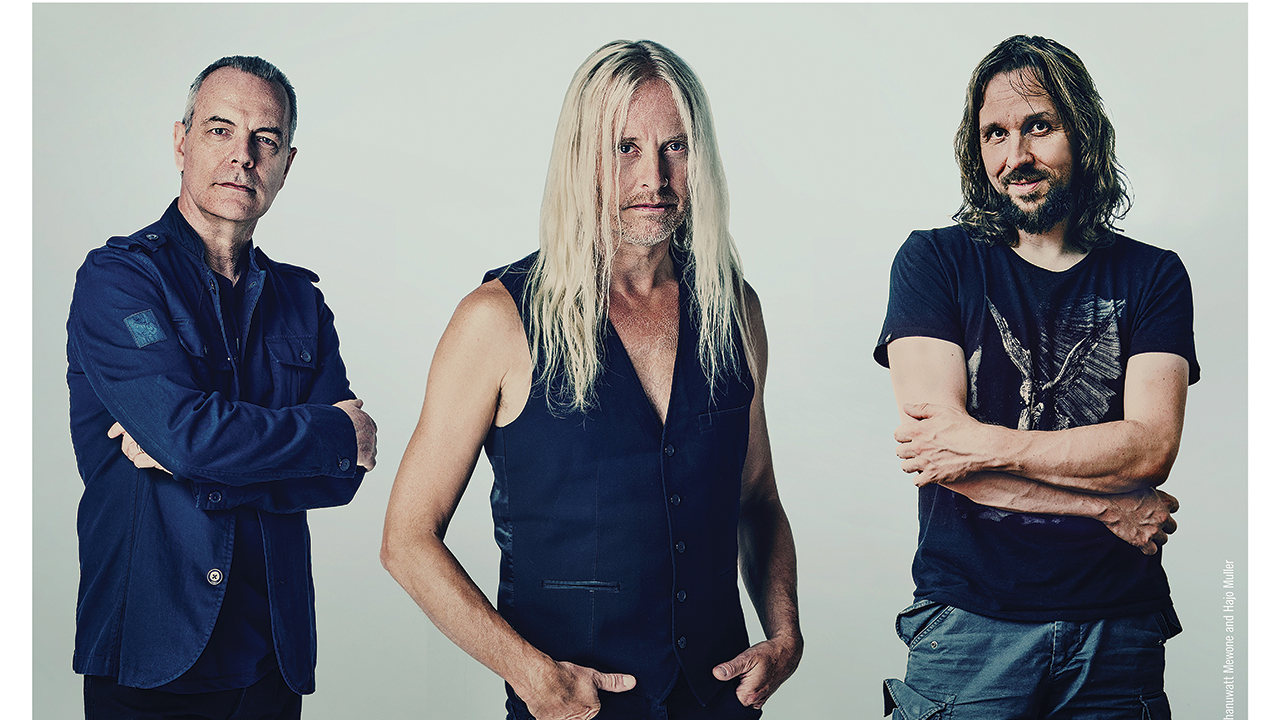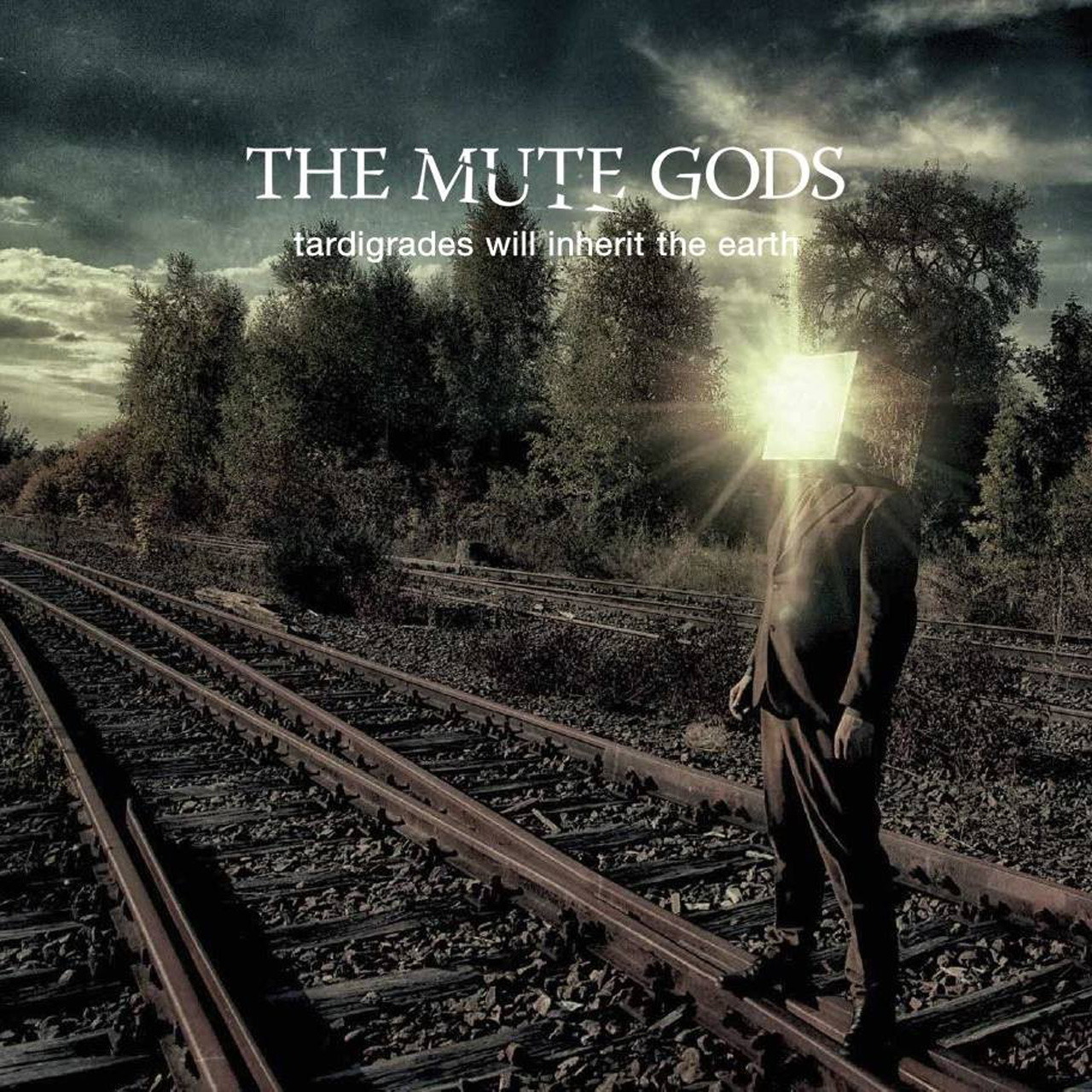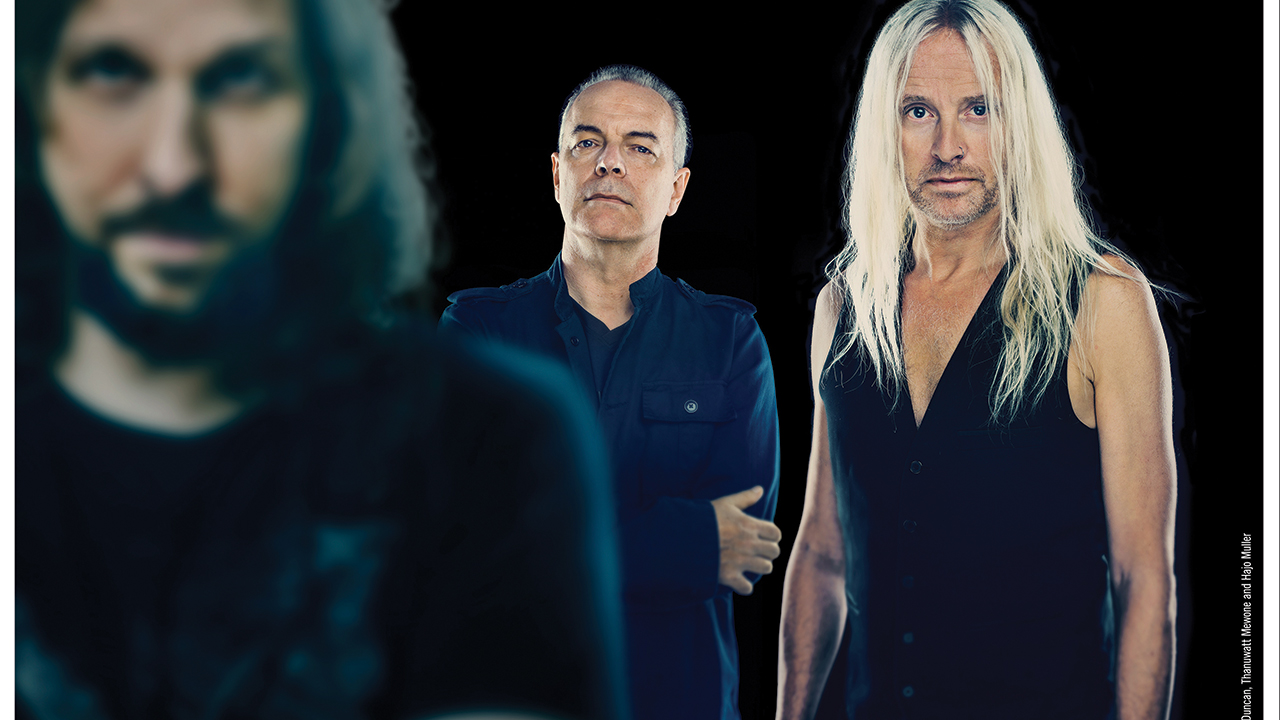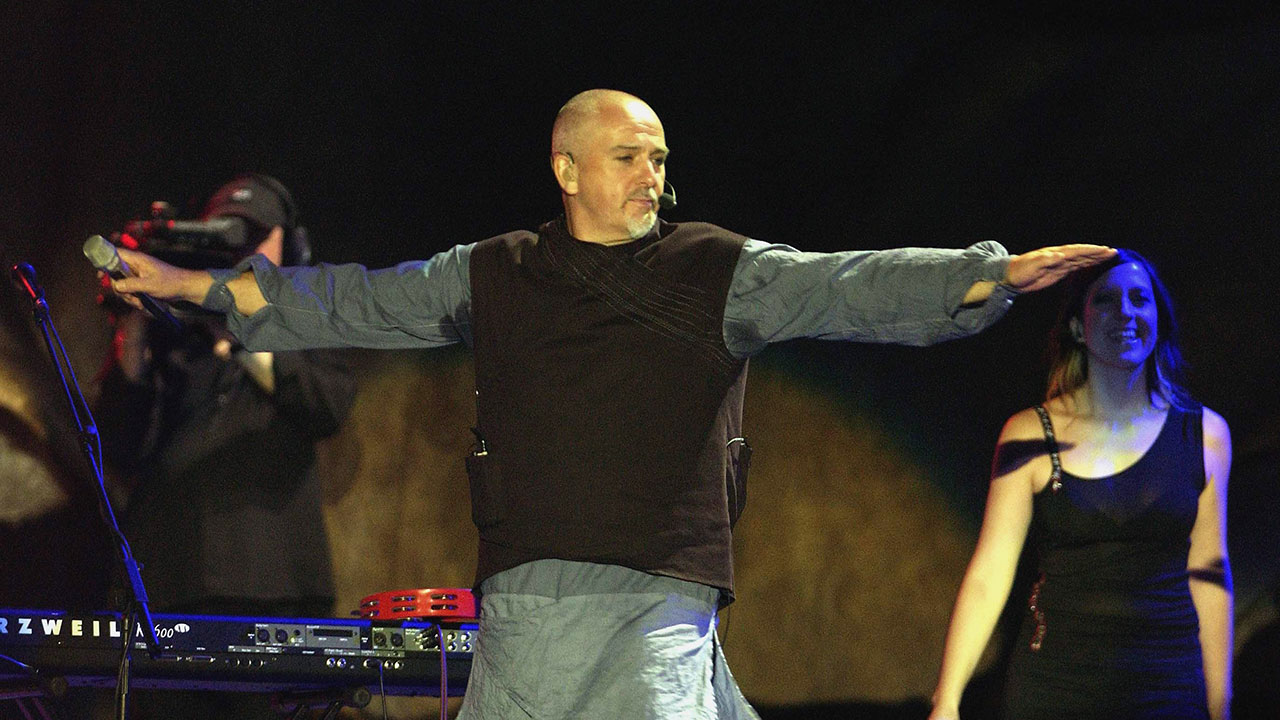"It's Rant City all the way!": The Mute Gods and how tardigrades will inherit the earth
Nick Beggs discusses The Mute Gods second album and the state of humankind as he sees it

At first glance, the tardigrade looks like the stuff of David Attenborough’s nightmares. An eight-legged ‘micro-animal’ measuring around half a millimetre long and resembling a malevolent Doctor Who alien crossed with a hoover bag, they’re ugly critters.
In reality, tardigrades are among the most remarkable creatures on this planet. Almost supernaturally resilient, they can successfully exist anywhere, from the wastes of the Antarctic to the deepest ocean trenches. They were even found on the outside of the International Space Station, making them the only other species alongside humans to live in space. Come a nuclear war, it won’t be the cockroaches or Keith Richards that survive – it will be the tardigrades.
Nick Beggs, singer and driving force behind The Mute Gods, is fascinated by the idea of these tiny beasts. So much so he’s even titled The Mute Gods’ second album, Tardigrades Will Inherit The Earth, after them.
“They symbolise the fact that, as humans, we don’t matter,” says Beggs. “We’re just another organism that have come along, and now we’re on our way out. I’ve used them as a metaphor to represent the next triumphant organism. Once we’ve finished with the world, it will be theirs.”
He’s not kidding when he says this. Events recent and not so recent – the US election, a new Cold War, the accelerating collapse of the environment – have given Beggs a dim view of mankind’s future. And if we are all going to hell in a handcart, we’ve only got ourselves to blame.
“We have this ability to really fuck things up,” he says. “Take NASA. These are the greatest super-brains the world has ever seen, but they’ve managed to entomb the planet in a cloud of space junk. At what point did they think this wasn’t going to happen? Frank Zappa said, ‘Scientists tell us that the most abundant element in the universe is helium. I beg to differ. It’s clearly stupidity.’ We’re living in a time with a high propensity for stupidity.”

An album built around the impending demise of mankind is the last thing you’d expect from that bloke who used to be in Kajagoogoo. But the hair beads, voluminous 80s trousers and frothy funk pop were long ago packed away into the furthest corners of the cultural attic. These days, Beggs is the go-to bassist and Chapman Stick player for a host of prog A-listers, from Steven Wilson to Steve Hackett.
Sign up below to get the latest from Prog, plus exclusive special offers, direct to your inbox!
The Mute Gods is the first time that Beggs has assumed the mantle of frontman and leader, though. He may have flanked himself with similarly crack musicians (drummer and fellow Steven Wilson band member Marco Minnemann and Hackett keyboard player Roger King), but The Mute Gods is his vision. That also explains the urgency that fuels the endeavour – the trio’s new album comes just 13 months after their debut, Do Nothing Till You Hear From Me.
“I felt like I had to strike while the iron was hot,” says Beggs. “I’ve been in this crazy game for a while now, but never as a solo artist or as the leader of a band. Once I realised I could do it, I was like a greyhound out of a trap.”
Beggs started writing new material as soon as he had finished The Mute Gods’ first album. Some of the songs even predate that record – two of them, the instrumental The Andromeda Strain (the title inspired by the 70s sci-fi doom flick of the same name) and closing ballad Stranger Than Fiction, date back around eight years.
“I’ve been doing this for 34 years,” he says. “I’ve written a lot of songs, and not always with an outlet or a vision of where they would end up. Most of them have ended up in the bin, and rightly so because they were shit. I hadn’t found a place for those two songs until now.”
The latest album shares much of its DNA with its predecessor: its songs are compact and melodic, veering closer to alt-rock than traditional prog, albeit alt-rock with next-level musicianship. Where it does differ is in the metallic edge that glints through on some tracks, mirroring the album’s bleak lyrical viewpoint.
“For me, this is an angrier, darker album, which I made a deal with myself that I would do,” he says. “The first album, I didn’t want to be too ranty. But now the gloves are off. It’s Rant City all the way. This is the way I’ve felt for a long time about the state of things, and I’ve been getting more and more gnarly. It just happens that the timing couldn’t be better. It’s an unhappy coincidence.”
The album begins with an instrumental, Saltatio Mortis, that Beggs describes as “a funeral march for humanity”, and it doesn’t get any brighter from there. Aside from the extinction-level event predicted by the title track, Animal Army finds Beggs envisaging a world where nature has aggressively reasserted itself over “the shortsighted apes” (‘Bring an end to this insanity/Wiping out the scourge of humanity’), while We Can’t Carry On sets its targets on the people behind current geo-political machinations and a general populace who remain wilfully blind to it (‘We kill and die with our hubris on our sleeve’). Too Shy it’s not. But where does this unrelenting pessimism come from?
“It comes from spending decades of looking at and studying religion, and actually being part of a church for a long time,” he says. “You try to find the truth of the universe, the true meaning of life, through a theistic overview. I was part of that thinking for a long time, 20 years. I gave my all to it. But when I stood back and really started to analyse things from a different perspective, that opened my eyes.”
Religion – or the absence of it – is a key driving force for Beggs. His mother died when he was 17, and he was left to raise himself and his sister alone. Desperately trying to make sense of it all, he found solace in the church. “It may be oversimplifying things, but it gave me answers to things I couldn’t fathom,” he says.

For the next 20 years – through the height of Kajagoogoo’s success and the lean period that followed – he gave himself body and soul to Christianity, starting with his involvement with a Pentecostal Church in West London, passing through various Charismatic Churches and ending up at Catholicism, where he made pilgrimages to the holy site of San Damien in Italy and considered being baptised into that faith.
Then everything was turned on its head. His first marriage broke down, and he realised that everything he believed wasn’t just wrong, but anathema to the way he lived his life. It was, he says, a gradual, almost unnoticeable transition. But five years ago, he began to clearly renunciate his views.
“I went from being a Christian to a pantheist to an agnostic to an ‘It doesn’t fucking matter’. A lot of theistic thinkers think that morality stems from God. That’s simply not true. Humanity has the ability to stand on its own two feet. We have a strong moral compass of our own. We don’t need God to give us that.”
Today, his view of religion and the people who follow it is served with a dose of disdain. It’s there in the name of the band, and in the song Hallelujah, a bonus track on the new album that turns its withering gaze towards the impotence of religion as mankind hurtles towards oblivion. Does he have any respect for people who have faith these days? “As long as they keep it to themselves,” he says drily.
Ironically, one strand of Beggs’ current worldview could easily be perceived no less outlandish than the way he views religion. The title track of the band’s first album, Do Nothing Till You Hear From Me, was inspired by his research into alien activity on earth and its relationship with the military-industrial complex. While he’s loath to describe himself as a conspiracy theorist, he’s firm in his belief that there’s more going on than the people in charge are letting on.
“You know, when the President of the United States is powerless to change gun control law, he’s not in charge – so who is? Is it the National Rifle Association? Or something else? Then we get into the whole Disclosure subject, which is a huge topic. ‘Disclosure’ is a name given to the state of our relationship with intelligences that don’t come from Earth. There’s a lot of very credible people involved in it, and a lot of very credible evidence out there that this is happening.”
He pauses, possibly aware of how it might superficially sound. “It’s a very broad subject, and to delve into it would take a whole interview in itself.”
The church, the media, the military-industrial complex… is he getting angrier as he gets older?
“No, I was always pretty angry,” he says. “In a way, my Christianity helped me channel that into a more positive place. A friend of mine said to me, ‘You certainly aren’t as positive as you were when you had your faith.’ And I said, ‘Well, I think I’m channelling my anger in a very positive way.’ To put up with stupidity and not call it out when you hear it is a crime.”
Are you including yourself in that?
“Oh, totally,” he says, laughing. “I’m not saying how great I am. I’m a stupid fucker too. When I think about some of the things I’ve said over the years, I’d really like to meet myself and give myself a fucking punch in the face.”
For all its conceptual bleakness, The Mute Gods’ second possesses a glimmer of hope. It comes right at the very end, in the shape of the closing track, the delicate Stranger Than Fiction, an unvarnished love letter to Beggs’ second – and current – wife. Its message is simple: love can save all.
“I felt it had to be there – there’s not much hope or light on this album,” he says. “I think that’s all we’ve got, love and kindness. We’re not particularly good at extending that to each other, to other nations, to the biosphere at large. But it’s all we’ve got, so we better find a way of making it work.”
Love and kindness will save the world. Is that a naïve worldview to have?
“Yeah, yes it is. Business and money is winning, hands down, and if we can’t change those things… But you’re right. It’s naïve and it’s foolish and it probably won’t work.”
In the face of such pessimism, you have to wonder why Beggs carries on (perhaps that explains his decision to hold off on The Mute Gods playing live: “It’s too early. I need to see if there’s an audience for us – we’ll wait until the third album”). If things are so bleak, what’s the point?
“I’m a father and a grandfather, and I’ve invested great hope in my children and grandchildren,” he says. “I can’t give up on a world that holds them. I’m emotionally tied into the deal.”
For their sake, let’s hope the animal army put their plans on hold for now. The tardigrades may have to wait a while to gain control.
This article originally appeared in issue 74 of Prog Magazine.
Dave Everley has been writing about and occasionally humming along to music since the early 90s. During that time, he has been Deputy Editor on Kerrang! and Classic Rock, Associate Editor on Q magazine and staff writer/tea boy on Raw, not necessarily in that order. He has written for Metal Hammer, Louder, Prog, the Observer, Select, Mojo, the Evening Standard and the totally legendary Ultrakill. He is still waiting for Billy Gibbons to send him a bottle of hot sauce he was promised several years ago.

